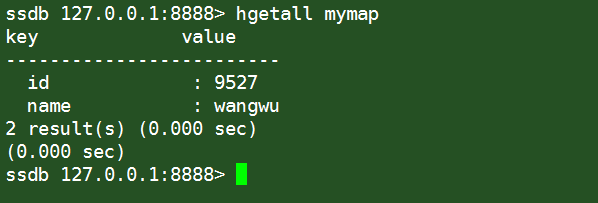基于C语言的ssdb笔记 ----hashmap的简单实例
ssdb支持 zset, map/hash, list, kv 数据结构,同redis差不多。下面是关于ssdb hsahmap的使用笔记
1.ssdb hashmap的命令
1.hset name key value
设置hashmap中指定key的值
2.hget name key
获取hashmap中指定key的值
3.hdel name key
删除hashmap中指定的key
4.hincr name key [num]
使hashmap中key对应的值增加num
5.hexists name key
判断指定的key是否存在于hashmap中
6.hsize name
返回hashmap中元素的个数
7.hlist name_start name_end limit
列出名字处于区间 (name_start, name_end] 的 hashmap.
8.hrlist name_start name_end limit
逆序
9.hkeys name key_start key_end
列出 hashmap 中处于区间 (key_start, key_end] 的 key 列表.
10.hgetall name
返回整个 hashmap.
11.hscan name key_start key_end limit
列出 hashmap 中处于区间 (key_start, key_end] 的 key-value 列表.
12.hrscan name key_start key_end limit
像 hscan, 逆序.
13.hclear name
删除 hashmap 中的所有 key.
14.multi_hset name key1 value1 key2 value2 ...
批量设置 hashmap 中的 key-value.
15.multi_hget name key1 key2 ...
批量获取 hashmap 中多个 key 对应的权重值.
16.multi_hdel name key1 key2 ...
指删除 hashmap 中的 key.
2.ssdb使用hashmap 存储获取的代码
这里因为ssdb是完全兼容redis的,所以完全可以用redis的库的接口函数。因为这样的特性,使得使用redis的项目很容易的能迁移到ssdb,作者的原博客也有完整的redis迁移到ssdb的完整教程。
ssdb的连接
redisContext *conn = redisConnect(host,port);
host:连接ssdb的主机ip
port:连接端口
返回值 redisContext结构体 定义如下
/* Context for a connection to Redis */ 2 typedef struct redisContext { 3 int err; /* Error flags, 0 when there is no error */ 4 char errstr[128]; /* String representation of error when applicable */ 5 int fd; 6 int flags; 7 char *obuf; /* Write buffer */ 8 redisReader *reader; /* Protocol reader */ 9 10 enum redisConnectionType connection_type; 11 struct timeval *timeout; 12 13 struct { 14 char *host; 15 char *source_addr; 16 int port; 17 } tcp; 18 19 struct { 20 char *path; 21 } unix_sock; 22 23 } redisContext;
ssdb的命令执行
redisReply* reply = redisCommand(conn,cmd)
conn:redis的连接句柄
cmd:执行的命令
返回值:redisReply结构体 结构体如下:
1 /* This is the reply object returned by redisCommand() */ 2 typedef struct redisReply { 3 int type; /* REDIS_REPLY_* */ 4 long long integer; /* The integer when type is REDIS_REPLY_INTEGER */ 5 size_t len; /* Length of string */ 6 char *str; /* Used for both REDIS_REPLY_ERROR and REDIS_REPLY_STRING */ 7 size_t elements; /* number of elements, for REDIS_REPLY_ARRAY */ 8 struct redisReply **element; /* elements vector for REDIS_REPLY_ARRAY */ 9 } redisReply;
其中type元素的类型可用来判断放回结果的状态:
REDIS_REPLY_STRING 1 //返回字符串,查看str,len字段
REDIS_REPLY_ARRAY 2 //返回一个数组,查看elements的值(数组个数),通过element[index]的方式访问数组元素,每个数组元素是一个redisReply对象的指针
REDIS_REPLY_INTEGER 3 //返回整数,从integer字段获取值
REDIS_REPLY_NIL 4 //没有数据返回
REDIS_REPLY_STATUS 5 //表示状态,内容通过str字段查看,字符串长度是len字段
REDIS_REPLY_ERROR 6 //表示出错,查看出错信息,如上的str,len字段
redisReply的释放
freeReplyObject(reply);
用来释放执行命令后所占用的内存
ssdb连接的释放
redisFree(conn);
完整代码如下:
1 redisContext* ssdb_init(const char* host,uint16_t port) { 2 redisContext *conn = redisConnect(host,port); 3 if(conn->err) { 4 printf("connection error:%s\n",conn->errstr); 5 redisFree(conn); 6 return NULL; 7 } 8 return conn; 9 } 10 11 void ssdb_finit(redisContext *conn) { 12 if (conn) 13 redisFree(conn); 14 } 15 16 redisReply* ssdb_command(redisContext *conn,char *cmd) { 17 redisReply* reply = NULL; 18 if(NULL != conn && cmd != NULL) { 19 reply = redisCommand(conn,cmd); 20 } else { 21 printf("redis err\n"); 22 return NULL; 23 } 24 return reply; 25 } 26 27 int main(){ 28 char buf[1024] = {0}; 29 char name[1024] = {0}; 30 char key[1024] = {0}; 31 char value[1024] = {0}; 32 redisReply* reply = NULL; 33 redisContext *ssdb_conn = ssdb_init("127.0.0.1",8888); 34 if(ssdb_conn == NULL){ 35 printf("ssdb conn err...\n"); 36 return 0; 37 } 38 memcpy(name,"mymap",5); 39 memcpy(key,"name",4); 40 memcpy(value,"wangwu",6); 41 snprintf(buf,sizeof(buf),"hset %s %s %s",name,key,value); 42 reply = ssdb_command(ssdb_conn,buf); 43 if(reply != NULL){ 44 if(reply->type == REDIS_REPLY_ERROR) 45 printf("commd err:%s\n",reply->str); 46 freeReplyObject(reply); 47 } 48 49 //根据指定key获取value值 50 memset(buf,0,sizeof(buf)); 51 memcpy(buf,"hget mymap name",sizeof(buf)); 52 reply = ssdb_command(ssdb_conn,buf); 53 if(reply == NULL) 54 return 0; 55 if(reply->type == REDIS_REPLY_ERROR){ 56 printf("commd err:%s\n",reply->str); 57 freeReplyObject(reply); 58 return -1; 59 } 60 printf("the value this is:%s\n",reply->str); 61 freeReplyObject(reply); 62 63 //获取mymap里所有的key-value值 64 memset(buf,0,sizeof(buf)); 65 memcpy(buf,"hgetall mymap",sizeof(buf)); 66 reply = ssdb_command(ssdb_conn,buf); 67 if(reply == NULL) 68 return 0; 69 int i = 0;
/*此处对于获取的hashmap来说这个返回的数组每个key-value是占有两个元素的第一个元素为key 后一个元素为前一个元素的值*/ 70 for(i = 0;i < reply->elements;i+=2){ 71 printf("key:%s values:%s\n",reply->element[i]->str,reply->element[i + 1]->str); 72 } 73 74 freeReplyObject(reply); 75 return 0; 76 }
执行效果图如下:






 浙公网安备 33010602011771号
浙公网安备 33010602011771号